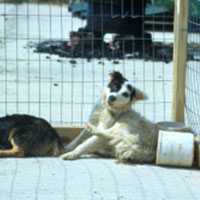Identification of a Novel Influenza Strain that Causes Kennel Cough
 “Kennel cough” or infectious tracheobronchitis (ITB) is an acute, contagious respiratory infection in dogs characterized mainly by coughing. Canine ITB is considered one of the most prevalent infectious respiratory diseases in dogs worldwide. Outbreaks can reach epidemic proportions when dogs are housed in high-density population environments such as kennels. Canine ITB can be triggered by a variety of pathogens, including canine influenza virus. Influenza constantly evolves and is easily transmitted, spreading rapidly in epidemics. Because of the serious nature of influenza virus infection, there remains a need for methods for diagnosing, preventing, and treating infection by influenza virus.
“Kennel cough” or infectious tracheobronchitis (ITB) is an acute, contagious respiratory infection in dogs characterized mainly by coughing. Canine ITB is considered one of the most prevalent infectious respiratory diseases in dogs worldwide. Outbreaks can reach epidemic proportions when dogs are housed in high-density population environments such as kennels. Canine ITB can be triggered by a variety of pathogens, including canine influenza virus. Influenza constantly evolves and is easily transmitted, spreading rapidly in epidemics. Because of the serious nature of influenza virus infection, there remains a need for methods for diagnosing, preventing, and treating infection by influenza virus.
In a collaborative study with the University of Florida and Cornell University, CDC researchers identified a new influenza strain that leads to “kennel cough.” Scientists performed a molecular characterization of canine influenza and revealed that the subtype, H3N8, of the influenza A virus is causative of the disease. Characterization of canine influenza virus laid the ground work for the development of diagnostic tools to identify infections as well as production of a vaccine that protects against future canine influenza infections.
- Page last reviewed: June 29, 2017
- Page last updated: July 8, 2016
- Content source:
- Office of the Associate Director for Science


 ShareCompartir
ShareCompartir